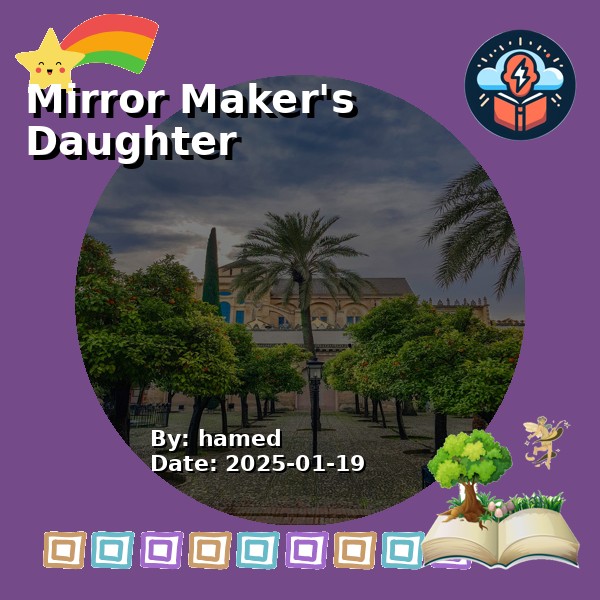In the quiet town of Kota Bharu, beneath the shade of ancient trees and the hum of the marketplace, lived a craftswoman named Amirah. She was known for her skill in creating mirrors—silvered glass set in ornate wooden frames—but these were no ordinary mirrors. They held a secret, passed down through generations of women in her family, a secret that Amirah was only beginning to understand.
Her grandmother, an old woman with silver hair and eyes that seemed to hold a thousand stories, had taught her the craft when she was young. “A mirror,” her grandmother would say, “is not just a reflection. It holds memories, and in the right hands, it can bring them back.”
As a child, Amirah thought her grandmother's words were nothing more than a metaphor for the delicate art of mirror-making. But on the night of her twenty-first birthday, something changed. A visitor arrived in their shop—a man with eyes full of sorrow and a heart that spoke of lost love. He held in his hand a small locket, inside which was a faded photograph of a woman Amirah had never seen.
“Can you make me a mirror that shows her?” the man asked softly, his voice thick with yearning. “I need to see her again, to remember her smile.”
Amirah's hands trembled as she accepted the locket. Her grandmother had always warned her that certain requests carried a price, but she hadn’t understood what that meant until now. There was a feeling in the air, like something ancient stirring within her.
She began working on the mirror late that night, using silver dust, glass, and the faintest whisper of moonlight. The frame, carved with intricate patterns of lotus flowers and mythical creatures, seemed to come alive under her hands. As she worked, she could feel a strange warmth spreading through her chest, as though her own heart were being woven into the glass.
When the mirror was complete, it shimmered with a soft, ethereal glow. The man returned, his eyes wide with hope, and placed the locket into her hands.
Amirah held the mirror up, the reflection slowly forming. At first, it was blurry, but soon, the face of the woman in the photograph appeared. Her smile was soft, and her eyes held a deep, knowing sadness, as if she had been waiting for this moment.
The man gasped. “That’s her! That’s my love.”
But as he reached out, something strange happened. Amirah felt a sharp pain in her chest, a pulling sensation, as if the mirror were pulling a piece of her soul into it. She staggered back, clutching her heart. Her reflection began to blur, fading from the surface of the mirror, until there was nothing left but a faint outline of her features, like the memory of a dream slipping away.
The man, oblivious to Amirah’s struggle, took the mirror in his hands and smiled through his tears. “Thank you,” he whispered, as he left the shop, never noticing that Amirah’s reflection had disappeared entirely.
For the next few days, Amirah could feel the emptiness inside her, a space where her own reflection should have been. The mirrors she created, each one for a lost love, seemed to take more of her with them. She no longer saw herself in the glass; she only saw the faces of others—lost lovers, yearning hearts, all reflected in the mirrors she made.
Her grandmother, sensing what had happened, sat her down one evening. “The mirrors are magic, child. They can show you what is lost, but at a cost. For each love you bring back, a piece of your own must be given. Your reflection, your heart, your soul... these are the prices of your craft.”
Amirah’s eyes filled with tears. “But I only wanted to help them. I only wanted to bring them what they sought.”
Her grandmother smiled gently, her old eyes filled with wisdom. “You have a gift, Amirah. But remember, the heart cannot be given away without consequence. There will come a time when you will no longer recognize yourself, when the mirror you create will reflect only what is lost.”
Amirah knew her grandmother was right. She had already begun to fade, her reflection slipping further away with each mirror she made. But she could not stop, for her craft was the only way she knew to ease the sorrow of those who had loved and lost.
Years passed, and Amirah became known as the Mirror Maker. People came from all over to ask for mirrors that would show them their lost loves, their forgotten memories. Each time, she sacrificed a little more of herself.
One day, a young woman came to the shop, holding a small locket just as the man had done years before. “Can you make me a mirror?” she asked, her voice trembling. “To see him again... my love. I just want to remember him.”
Amirah looked at the locket, the familiar pang of sorrow tugging at her heart. She reached out to take it, but as her fingers brushed the cold metal, she knew she could no longer give away any more of herself.
“I cannot,” she whispered, her voice breaking.
The young woman looked at her, confusion and sadness in her eyes. “But you are the Mirror Maker.”
Amirah nodded slowly. “And now I must be the keeper of my own reflection.”
For the first time in many years, Amirah gazed into the mirror on the wall. Her face was faint, almost invisible, but it was hers. She had finally stopped giving pieces of herself away.
And as the young woman left, Amirah began to understand the true price of love—that sometimes, to find what is lost, we must risk losing ourselves.
But some reflections, she realized, are worth keeping.
